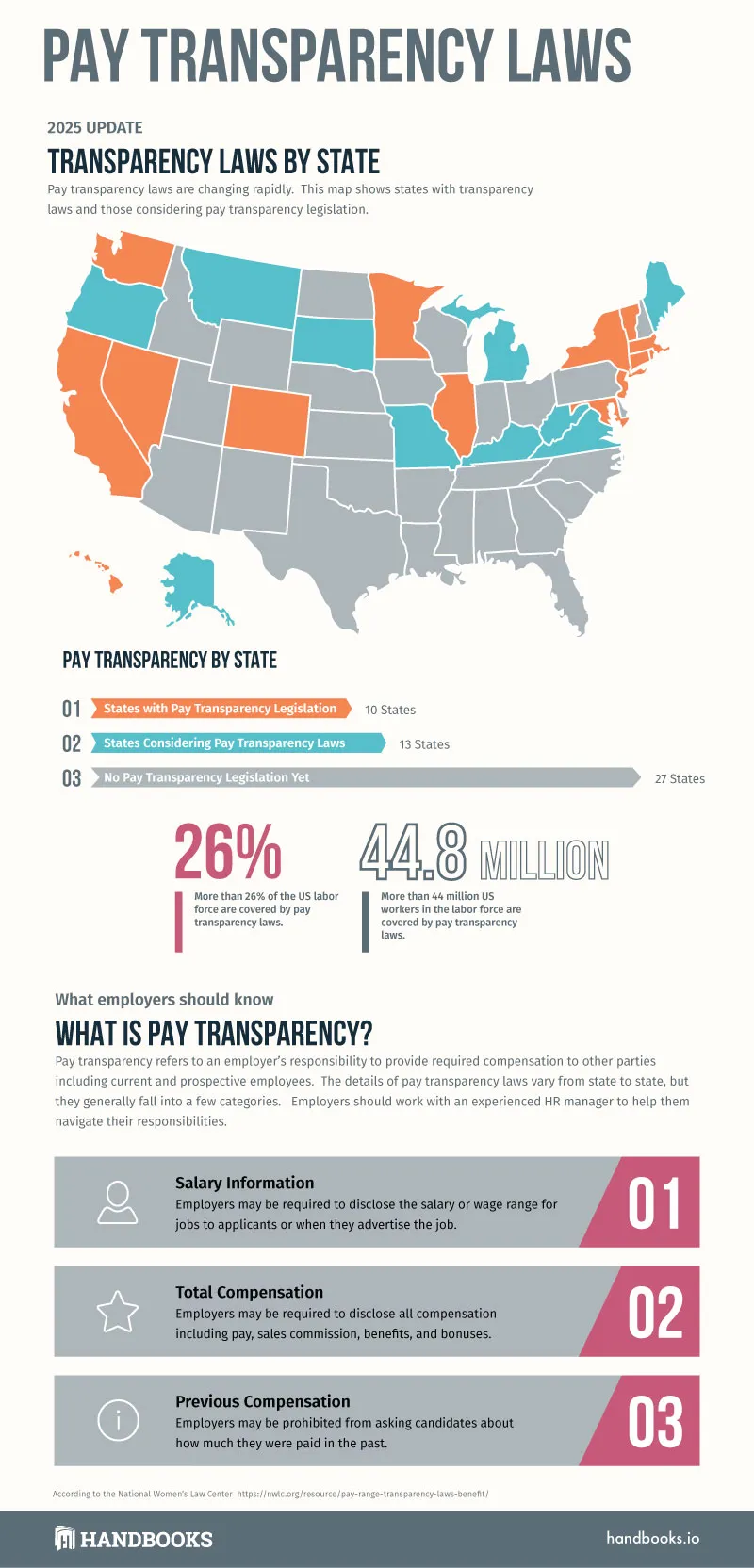Pay transparency laws are changing quickly - here's a state by state guide
More than 26% of U.S. workers are covered under pay transparency laws.

More than 25% of U.S. workers are covered under pay transparency laws.
The details vary by state, but basic themes include:
- Disclosing pay ranges for job postings
- Disclosing pay ranges to employees and applicants
There was a time in recent history when employee discussions about compensation were prohibited, frowned upon, and generally considered bad taste. Those days are over. New laws require employers to explicitly disclose salary ranges in more states than ever. There is also a substantial push for transparency at the federal level (the Salary Transparency Act and Pay Equity for All Act were introduced in Congress was introduced last year).
In recent years, we have seen a significant shift towards pay transparency, with multiple states and cities implementing laws designed to address wage inequality and empower job seekers. As of 2025, these laws reflect a growing trend towards openness in compensation, challenging the traditional secrecy surrounding salaries in the workplace. Here is an overview of pay transparency laws across the U.S., focusing on specific states and cities that have enacted pay transparency rules.
Understanding Pay Transparency Laws
Pay transparency laws generally mandate that employers disclose salary ranges for positions to job applicants, and sometimes even to existing employees. The primary objectives of these laws are to reduce gender and racial wage gaps and to foster a more equitable and competitive job market. These laws vary in terms of scope, with some applying to all employers and others targeting businesses of a certain size or type.
States and Cities with Pay Transparency Laws
California
- California’s pay transparency law requires companies with 15 or more employees to provide the pay scale for a position. Additionally, employers must maintain records of job titles and wage history for each employee, which can be used for compliance purposes.
- Employers are not allowed to ask a job applicant about their salary history.
- Employers are required to disclose salary information to current employees upon request.
- Penalties for non-compliance range from $100-10,000 per violation.
Colorado
- Colorado’s Equal Pay for Equal Work Act requires all job postings to include a salary range and a general description of benefits.
- This law applies to all employers, regardless of size, and includes remote positions that could be filled by a Colorado resident.
- Effective as of January 1, 2024
- Penalties for non-compliance range from $500-10,000 per violation.
Connecticut
- Connecticut’s transparency law mandates that employers provide applicants with the wage range for a position either when an offer is made, when the applicant requests it, or after their first interview, whichever comes first. This law applies to all employers in the state.
- Employers may not ask about an applicant’s pay history unless it is voluntarily disclosed.
- An employee or applicant can bring a civil lawsuit against an employer who violates the statute for up to two years.
Hawaii
- To comply with Hawaii’s Pay Transparency law, employers must disclose the hourly rate or salary range that accurately reflects the compensation.
- The law is effective January 1, 2024
- This law applies to employers with at least 50 employees and excludes unions and internal transfers or promotions.
- Penalties for non-compliance include civil actions and punitive damages.
Illinois
- To comply with Illinois law, employers must provide wage scale or salary information as well as benefits information in all job postings.
- This law applies to employers with at least 15 employees.
- The effective date is January 1, 2025.
- Employers must notify internal employees of openings within 14 days of posting a job.
- Specific penalties for non-compliance are not defined.
Maryland
- Maryland’s Equal Pay for Equal Work law requires employers with 15 or more employees to provide a wage range upon request of the job applicant.
- The law prohibits employers from requesting an employee's wage history to prevent reliance on past earnings to set wages.
- Penalties for non-compliance include a fine of up to $600 per violation.
Massachusetts
- In Massachusetts, employers must disclose the pay salary or hourly wage wherever jobs are advertised, as well as to internal applicants.
- The law is effective as of October 29, 2025
- Pay range disclosure applies to companies with 25 or more employees.
- Employers have two business days to correct errors for the first two years of the law’s effective date (a grace period).
- Penalties for non-compliance can be as high as $25,000 for repeated violations.
Minnesota
- In Minnesota, employers must provide a starting salary range as well as other compensation benefits like retirement plans, or group health insurance.
- The effective date for the law is January 1, 2025
- Pay range disclosure applies to companies with 30 or more employees.
- Penalties for non-compliance are not specified.
Nevada
- In Nevada, employers are required to provide the salary or wage range to applicants after an initial interview, and to current employees seeking promotion or transfer upon request, or if they receive an offer for a new position.
- Penalties for non-compliance include civil action and a fine of up to $5,000 per violation.
- This law applies to all Nevada employers.
New York State
- In New York State, employers with four or more employees must provide job applicants with the minimum and maximum salary for the position they are applying for, upon request.
- The law applies to jobs that can be performed in New York, or that will be supervised in New York.
- Penalties for non-compliance include $1,000 for the first offense, $2,000 for a second offense, and $3,000 for subsequent violations.
Rhode Island
- Per Rhode Island’s Pay Equity Act, companies must disclose salary ranges for applicants and employees upon request and before discussing an offer, or prior to moving into a new role.
- Companies may not ask about an applicant's wage history.
- This law applies to all Rhode Island employers.
- Penalties for non-compliance include fines of up to $5,000.
Vermont
- Vermont’s pay transparency law requires employers to provide the compensation range for any job opening.
- The law is effective on July 1, 2025.
- Pay range disclosure applies to companies with 5 or more employees.
- Penalties for non-compliance are not specified.
Washington State
- Washington’s pay disclosure law applies to employers with 15 or more employees. It requires them to disclose the minimum and maximum salary for a position when it is offered and upon request after an initial job offer.
- It applies to employers with 15 or more employees if they have at least one Washington employee or recruit in Washington.
- Penalties for non-compliance include a fine of $500-$1,000 or a percentage of damages.
Cities with Pay Transparency Policies
- Jersey City, New Jersey - Employers with 5 or more employees must disclose salary ranges.
- Ithaca, New York - Employers with 4 or more employees must disclose salary ranges.
- New York City, New York - Employers with 4 or more employees must disclose salary ranges.
- Westchester County, New York- All employers must disclose salary ranges.
- Cincinnati, Ohio - Employers with 15 or more employees must disclose salary ranges.
- Toledo, Ohio - Employers with 15 or more employees must disclose salary ranges.
It’s important to note that there are around 15 additional states considering similar legislation around pay transparency.
Here’s a list of states with pending legislation:
- Alaska
- District of Columbia
- Kentucky
- Maine
- Massachusetts - Legislation has been passed and the effective date is October 29, 2025
- Michigan
- Missouri
- Montana
- New Jersey - Legislation has been passed and the effective date is July 1, 2025
- Oregon
- South Dakota
- Vermont - Legislation has been passed and the effective date is July 1, 2025
- Virginia
- West Virginia
Pay transparency laws have considerable implications for both employers and employees. Employers must adjust their hiring practices to ensure that salary ranges are determined and disclosed according to the law.
For employees and job seekers, these laws offer greater transparency, enabling them to make more informed decisions about job opportunities. Pay transparency can also empower employees to negotiate salaries more effectively and can contribute to reducing wage disparities based on gender, race, or other factors.
Challenges and Considerations
While the intent behind pay transparency laws is widely praised, there are challenges. Employers express concerns about increased competition and difficulties in negotiating salaries. There's also the complexity of managing varying laws across different states and cities for multi-state employers.
From an employee perspective, while these laws provide more information, they don't guarantee equal pay. Employees must still advocate for themselves in salary negotiations. Additionally, these laws may lead to unintended consequences, such as employers setting wider salary ranges to maintain flexibility.
Takeaways
The trend toward pay transparency marks a significant shift in the American workplace. These laws try to create a more equitable job market by giving job seekers the information they need to negotiate fair wages. For employers, staying informed and compliant with these evolving laws is crucial. As the landscape continues to change, both employers and employees must adapt to this new era of openness in compensation. Pay transparency is not just a legal requirement but a step towards a more equitable and transparent job market.
![Pay Transparency Laws by State - What you need to know [Updated for 2025]](/images/blog/pay_transparency_sm.webp)

















